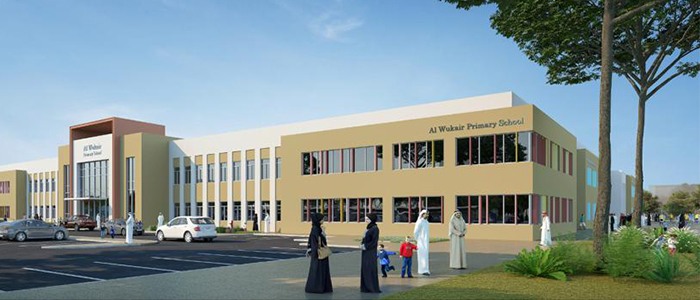The Ministry of Education and Higher Education (MoEHE) is opening at least eight new schools for the academic year 2022–23 at various locations in the country.
 Five out of the eight new schools started operating at the beginning of the new academic year 2022-23 on 21 August 2022 for boys and girls in the preparatory and secondary stages.
Five out of the eight new schools started operating at the beginning of the new academic year 2022-23 on 21 August 2022 for boys and girls in the preparatory and secondary stages.
These five new schools are Amr Ibn Al Aas Secondary School for Boys (Al Wakra area), Talha bin Obaid Allah Preparatory School for Boys (Rawdat Al Hamama, Al Daayen Municipality), Ramla Bint Abi Sufyan Secondary School for Girls (Umm Salal Muhammad, Umm Salal Municipality), Hind Bint Amr Al Ansaria Preparatory School for Girls (Bufasilah, Umm Salal Municipality), and Saeed Bin Zaid Preparatory School for Boys (Al Wukair, Al Wakra Municipality). The schools are distinguished by their modern buildings with all amenities such as a sports hall, theatre, science laboratories, art workshops, computer labs, outdoor playgrounds and an air-conditioned school assembly yard and dedicated parking.
HE the Minister of Education and Higher Education, Buthaniya bint Ali Al Nuaimi, issued a ministerial decision appointing principals for the five new schools: Said Abdel Hadi Saad Luthain (Amr Ibn Al Aas Secondary School for Boys), Gamal Mohamed Yakoub Al Jaber (Talha bin Obaid Allah Preparatory School for Boys), Maryam Khalaf Naser Hattab Al Kaabi (Ramla Bint Abi Sufyan Secondary School for Girls), Shaikhah Jubran Said Al Mazarkah Al Shahrani (Hind Bint Amr Al Ansaria Preparatory School for Girls), and Hassan Abdallah Mohamed Saleh Al Abdallah (Saeed Bin Zaid Preparatory School for Boys). The ministry added that these new five schools are part of the Qatar Public Private Partnership (PPP) Schools Development Programme and among a total of eight schools in the first package.
Each of the new schools will accommodate 786 students, including 36 children with disabilities, which are divided into six classes in each school, while the rest of the 750 students are divided into 30 classes.
 The ministry has been keen to implement the country’s sustainability standards during the construction of the schools. Environment-friendly materials were used to ensure their classification as green buildings according to national standards, while also implementing security and safety conditions and ensuring easy access for people with special needs.
The ministry has been keen to implement the country’s sustainability standards during the construction of the schools. Environment-friendly materials were used to ensure their classification as green buildings according to national standards, while also implementing security and safety conditions and ensuring easy access for people with special needs.
Some 225,118 students in 212 public schools and kindergartens, and more than 215,000 in 338 private schools and kindergartens returned to school on 21 August 2022 for the new academic year 2022-23. The academic year is expected to conclude in June 2023.
The arrangements for the new academic year include a number of axis and initiatives announced by HE the Minister of Education and Higher Education, Buthaina bint Ali Al Jabr Al Nuaimi, to develop the educational system in Qatar during the next eight years to achieve Qatar National Vision 2030.
The axis and initiatives were announced during the first educational meeting organised by the ministry under the slogan ‘A Flame of Learning’, which celebrated the start of the academic year 2022–23.
The axis centre around students, teachers, schools, and the ministry itself, while initiatives are concerned with training and mentoring new teachers, focusing on the quality of student life, and excellence by designing different development paths for public schools, as well as developing mechanisms to support and follow up on schools’ performance.
The FIFA World Cup Qatar 2022TM, an event that Qatar and the Arab region have been anticipating for 12 years, marked the academic year 2022–23. Schools closed for the World Cup. Mid-year holidays for all schools in Qatar started on 20 November and will end on 22 December 2022 — 10 days before the World Cup began and four days after it concludes.
In addition, this year also coincides with the 70th anniversary of the establishment of formal education in Qatar. The ministry will organise many events and related activities throughout the year.
Qatar PPP Schools Development Programme
The PPP programme was established to develop public infrastructure projects and introduce private capital and expertise in sectors otherwise under government control. Qatar’s Second National Development Strategy 2018–22 encourages greater private participation in economic activity, on its own or through PPP frameworks.
In line with that objective, the ministry has identified 45 schools to be implemented under a PPP framework. The 45 schools are divided into four packages, each consisting of eight to 14 schools.
Each package will be implemented as a separate PPP Project. The package, number of schools and expected delivery date for each of the packages areas follows:
Package
Package 1 – 8 schools – August 2022
Package 2 – 12 schools – August 2023
Package 3 – 14 schools – August 2024
Package 4 – 11 schools – August 2025
The Qatar PPP Schools Development Programme is a step in the direction of improving the innovation, quality and speed of construction together with improved operations and maintenance of the Independent schools.
The project has been launched to help the State of Qatar meet its increasing demand for good quality educational facilities. This demand is in line with Qatar National Vision 2030 and Qatar Second National Development Strategy 2018–22.
The project will deliver 12 schools, which are in line with education objectives mentioned in the Qatar Second National Development Strategy 2018–22. Some of the key policy objectives this programme aims to fulfil are as follows:
- To cater to ever-rising demand in the education sector driven by growth in the school, age population.
- Supporting human and social development.
- Supporting the urgent need to build more (domestic) capacity and expertise on project implementation.
- Improving the quality of education for Qataris to reach international standards.
- Reducing the inefficiencies in the Qatari educational system.
- Increasing job satisfaction in the education sector in Qatar.
- Promoting private sector participation in the education sector.
Author: Ola Diab
Copyright © Marhaba Information Guide. Reproduction of material from Marhaba Information Guide’s book or website without written permission is strictly prohibited. Using Marhaba Information Guide’s material without authorisation constitutes as plagiarism as well as copyright infringement.








